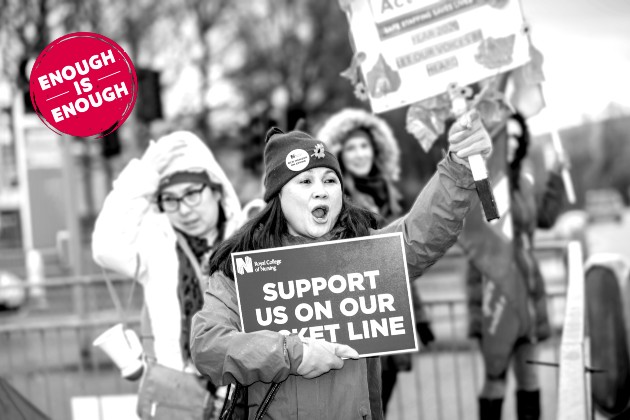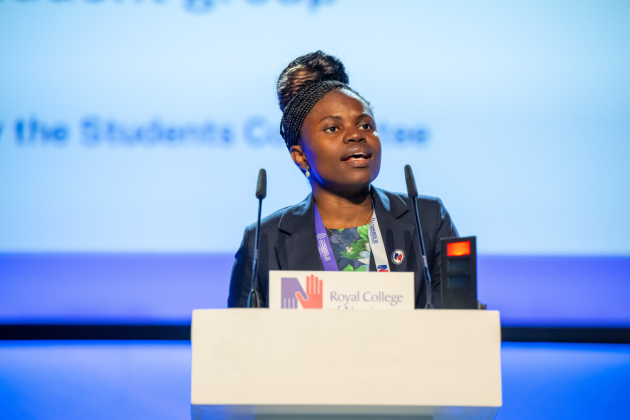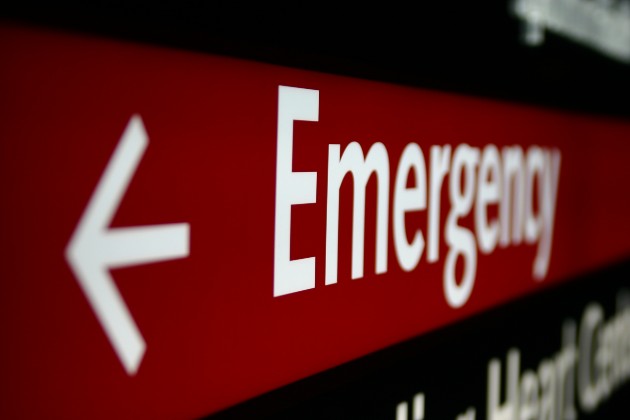The RCN's spring strike action will run differently to this, with no derogations. Find out what this means for you here.
Andrew's volunteering to be on an RCN strike committee to help industrial action run smoothly where he works. He talks through a typical strike day based on his previous experience of nursing strikes in Northern Ireland.
7-8am
Our strike committee meets onsite at 7.15am and two of us go to the picket line to put up official picket signage. We distribute RCN beanie hats, badges and flags to members there. Our picket line runs from 8am until 8pm so we have a rota for who’s on it. We usually have three-hour shifts.
Back in the strike committee room, we deal with any derogation requests. Most days there are additional requests first thing – it might be that there’s a procedure that’s an emergency or maybe an incident has happened overnight. We need to make sure the requested exemption relates to life-preserving care, so we go down to the area requesting derogation to find out more.
What is a strike committee?
Local strike committees are formed at each employer where strike action is planned. Committee membership varies, depending on the size of the employer, and should ideally have: an RCN officer, an RCN steward, an RCN elected branch official, a member who is representative of the area or type of work where the action is taking place, a member who works in management, and a designated person to liaise with the employer.
The committee is responsible for ensuring the strike is well planned and happens safely and effectively. It meets with senior managers and HR in advance of strike action to discuss which services can be withdrawn. It aims to make a success of the strike by withdrawing non-essential care, while maintaining life-preserving services. This is done through derogations.
9-10am
We speak with the organisation’s management team in their control room. During the Northern Ireland strikes three years ago, which I also volunteered for, this was near the strike committee room. This was essential to make sure we could easily communicate. They tell us if A&E was busy overnight and can alert us to any emergency surgeries that could mean pulling staff off the picket line through a derogation.
10am-12 noon
A couple of strike committee members walk the wards where staff are derogated. They hand out strike support badges, making sure those exempt from striking feel involved and valued for their part in ensuring effective, safe strike action. If we’ve agreed a Christmas Day staffing model (see below) with a particular service, we don’t want them having more staff in that area as that will lessen the impact and success of the strike.
We also speak to the regional strike oversight committee. Their role is to supervise the various local strike committees and report to their RCN country and regional boards.
Sometimes tough decisions about derogations have to be made. That’s why we have nurses on the strike committee who understand the NMC Code and patient care. Their job is to get all the information from the different service areas and determine what staffing levels are essential.
We also escalate decisions to the oversight committee so there’s a higher level of scrutiny and assurance about patient safety. We err on the side of caution if in doubt.
What is a derogation?
A derogation is an exemption, either of an individual or a whole service, from taking part in strike action. Derogations are what the RCN uses to deliver safe strikes.
There are three models of derogation:
- a complete derogation model with an entire service being exempt from strike action, such as intensive care units
- a Christmas Day service model where staffing levels match those on public holidays
- a night duty model where the night duty numbers are agreed to cover the day duties with requests for further staffing considered on a case-by-case basis. The models of derogation depend on the service and need. Derogation is not about continuing business as usual but about protecting patient safety during strike action. We still want to make an impact.
12-3pm
It’s important committee members get a lunch break and we make sure people are OK on the picket line. All striking staff will have access to a break room on the day.
There’s a lot of media attention, especially on the first day of strike action. Some members of the strike committee speak to local news outlets, or even national ones. There’s likely to be interest throughout the day from local councillors, MPs and members of the public, too. In Northern Ireland in 2019, someone turned up with a carload of fresh buns, cakes, tea and coffee for those on the picket line. It was amazing to see the support we had.
3-6pm
The strike committee meets again mid-afternoon to discuss any derogation requests for the next strike day. The same process for walking the wards happens to ensure patients are being kept safe, but staffing is still at a level that is having an impact on non-life-preserving care.
6-8pm
We need to dismantle the picket line by 8pm and store everything in the strike committee room. Most people go home around 7pm, so it’s just a case of clearing up and making sure there’s no litter or anything left.
Want to help out on strike days? We’re recruiting to a number of strike volunteer roles.
What's the latest on strike action?
Find out more about our Fair Pay For Nursing campaign and get updates on strike action.
Other useful links:








